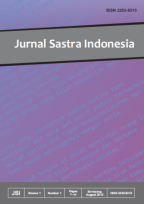DONGENG ABAD 21: MODERNISASI SASTRA ANAK BERBASIS PSIKOLOGI PERKEMBANGAN
##plugins.themes.academic_pro.article.main##
Abstract
Tulisan ini memaparkan prinsip pengembangan cerita anak (dongeng) berdasarkan psikologi perkembangan anak. Penelitian ini menggunakan prosedur penelitian Research and Development (penelitian dan pengembangan). Data pada penelitian ini meliputi (1) deskripsi hasil analisis struktur cerita anak, (2) deskripsi hasil analisis keterkaitan tema dan jalan cerita dalam dongeng, dan (3) skor kecenderungan analisis kebutuhan psikologi, sosial, dan moral pada anak usia dini. Berdasarkan hasil analisis, diketahui bahwa seluruh dongeng anak nusantara tidak memiliki struktur yang lengkap. Selain itu, diketahui juga terdapat ketidaksamaan tema dengan alur, rangkaian peristiwa dalam cerita banyak berisi hal-hal yang negatif, dan hal ini bertentangan dengan nilai yang akan diajarkan pada tema. Selain itu, berdasarkan hasil sinkronisasi karakteristik data dari hasil analisis kebutuhan cerita anak pada usia dini serta pedoman mengembangankan cerita anak berbasis psikologi perkembangan, didapatkan tiga prinsip dasar pengembangan cerita anak, yaitu 1) struktur, 2) unsur intrinsik , dan 3) unsur ekstrinsik.
This paper describes the principle of developing children's stories (fairy tales) based on the psychology of child development. This study uses Research and Development research procedures (research and development). The data in this study include (1) a description of the results of the analysis of children's story structure, (2) a description of the results of the analysis of the theme and storyline in fairy tales, and (3) the trend score for analyzing psychological, social, and moral needs in early childhood. Based on the results of the analysis, it is known that all Indonesian children's stories do not have a complete structure. In addition, it is known that there are also themes inequality with the plot, the series of events in the story contains a lot of negative things, and this is contrary to the value that will be taught on the theme. In addition, based on the results of synchronization of data characteristics from the analysis of children's story needs at an early age as well as guidelines for developing children's stories based on developmental psychology, three basic principles for developing children's stories are obtained: 1) structure, 2) intrinsic elements, and 3) extrinsic elements.
